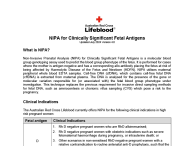Fetal blood group testing
Lifeblood offers two separate non-invasive prenatal tests for fetal blood group determination in Australian mothers:
- RHD NIPT for RhD-negative women to determine fetal RhD status which enables targeted antenatal RhD immunoglobulin prophylaxis
- NIPA for clinically significant fetal blood group antigens in alloimmunised pregnant mothers to assist managing pregnancies at risk of haemolytic disease of the fetus and newborn (HDFN).
These tests use a maternal blood sample to isolate fetal cell-free DNA for molecular testing to predict fetal blood groups. Testing is NATA accredited and provided without cost to patients.
RHD NIPT for RhD-negative women:
- This test is indicated for non-alloimmunised RhD negative pregnant women for prediction of fetal RhD status, to enable targeted antenatal RhD immunoglobulin prophylaxis as per the National Blood Authority Guideline for the prophylactic use of RhD immunoglobulin in pregnancy care.
- Testing may be performed from 15 weeks gestation using this request form with samples sent through your normal pathology provider and received by the Queensland Red Cell Reference Laboratory within 72 hours of collection.
- Further information is available in the information sheet.
- Reports are issued within 10 days of sample receipt and are sent to the referring pathology provider for distribution to the referring doctor. Reports will not be issued to the referring doctor or patient by Lifeblood.
- This test is only suitable for singleton pregnancies as sampling DNA from each fetus in a multiple gestation pregnancy cannot be ensured. Management with universal antenatal RhD immunoprophylaxis is recommended.
- If testing has an indeterminate result, repeat collection on a second occasion will be required. If repeat testing is again reported as indeterminate, consider management with routine antenatal RhD immunoprophylaxis.
NIPA for clinically significant fetal blood group antigens:
- This test is indicated for high-risk pregnant women with alloimmunisation to clinically significant blood group antigens where their fetus is at risk of HDFN.
- Fetal blood group antigens that may be determined include D, K/k, C, c, E, Fya and Fyb at appropriate maternal titre threshold.
- Testing may be performed from 12 weeks gestation using this request form with samples sent through your normal pathology provider and received by the Queensland Red Cell Reference Laboratory within 72 hours of collection.
- Further information, such as maternal titre threshold, is available in the information sheet.
Prediction of fetal RhD status is possible through both tests, see comparative table below.
| Test | RHD NIPT screening for non-alloimmunised pregnancy | RHD NIPA for alloimmunised pregnancy |
| Indications | Non-alloimmunised RhD negative pregnant women to enable targeted antenatal RhD-Ig immunoprophylaxis | Alloimmunised RhD negative pregnant women to determine if the current pregnancy is at risk of HDFN |
| Sample | 1x6mL dedicated EDTA | 3x6ml dedicated EDTA |
| Gestation | At least 15 weeks | At least 12 weeks |
| Time to process | Within 72 hours preferred | Must be within 72 hours from collection |
| Method | Digital PCR | Droplet digital PCR |
| Gene target | RHD Exon 5, 7 and 10 | RHD Exon 5 and 10 |
| Antigen prediction | RhD+ / RhD- / RhD inconclusive | RhD+ / RhD- / RhD inconclusive |
| Cost | No charge to patient or referring laboratory for MBS eligible patients. MBS Bulk billed. | No charge to patient or referring laboratory. Cost is covered by Lifeblood National funding arrangements. |
| Request form | NIPT for fetal RHD request form | Red cell reference laboratory request form |
| Information sheet | NIPT for fetal RHD information sheet | NIPA for fetal blood groups information sheet |
Our Research and Development team are performing two studies investigating NIPT for fetal blood group antigens in a research capacity:
- NIPT massively parallel sequencing (MPS) for clinically significant fetal antigens in pregnancies at risk of HDFN and/or fetal and neonatal alloimmune thrombocytopenia (FNAIT) in a single platform. This study is separate from the NATA accredited testing provided by Red Cell Reference and is investigating NIPT for further red cell and platelet antigens. Further information is available here or in the Frequently Asked Questions information sheet.
- NIPT for HPA-1, 3, 5 and 15 for HPA alloimmunised pregnant women from 12 weeks gestation, whose partner genotypes as HPA heterozygous for the target maternal HPA antibody. This study is in a research capacity and further information is available through the Queensland Platelet and Neutrophil Reference Laboratory: DL-QLDQTIS-PlateletandNeutrophil@redcrossblood.org.au
Updated September 2025
Further information
Related topics
External resources


